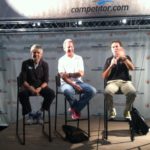Originally published as “The Recess Bell”, co-authored by Lee Allsbrook, now a retired Professor of Physical Education at Middle Tennessee State University.
– AS SIMPLE AS CHILD’S PLAY –
Robert Fulghum wrote that everything he really needed to know, he learned in kindergarten. Fulghum contends that the lessons of childhood, like sharing and playing fair, are just as important to us as adults.
We would argue that everything we really need to know about play, we also learned in kindergarten. As children we knew instinctively how to play, where to play, when to play, and how much to play. As children we knew that play had to include intensity and rest. And our wide-ranging curiosity led us naturally to engage in a variety of activities.
Whether alone or in group activities, children will be active only until they get tired, and then they’ll rest. Someone will call a time out and the group will fall laughing and exhausted to the ground. Before long, though, as their energy and desire to play returns, the children will be whirling dervishes once again.
It is in our nature as adults, it seems, to make everything more complicated than it needs to me. We want to explain every activity to ourselves in as technical and complex terms as possible. No subject in our lives is immune from our tendency to overstate the obvious.
And so it is with play. Children know that they need to play. Children are not apologetic about their desire to play. Children recognize that play is just as important as eating and sleeping. But somewhere between childhood and adulthood we are lead to believe otherwise. The result is adults who have lost the joy of activity.
It is disheartening to note how many of the good intentions of January have already given way to old habits. This self-imposed sentence of a life of sedentary confinement is all the more sad because it seems so unnecessary. An active lifestyle truly is as simple as child’s play.
So with a nod to Robert Fulghum, we make these humble suggestions about play, gathered from the collective wisdom of children:
1] Play is natural: You already possess all the knowledge and skill you need to play. You don’t need expensive equipment or fancy clothes to play.
2] Play is fun: If you have to “make” yourself do something, it isn’t play. If you’ve chosen an activity like running or aerobics because someone else told you that THEY liked it, but YOU have to force yourself to do it, STOP. Find something else.
3] Play makes you feel better: Children choose activities that make them feel good. No sane person will continue to do something that makes them feel worse than before they started. The joy of play is how GOOD, not how BAD, you feel.
4] Play is necessary: Finding time to play is difficult mostly because it comes after everything else. Play is one of the most important times of your day. Play is not only what you want to do, it is what you need to do.
5] Play how you feel: There is no need to over-organize your play. Some days you can play for a long time, other days, you’re just not in the mood or don’t have the time. Missing a day or two of play doesn’t mean you have to quit. Play whenever you can, wherever you are.
6] Play with friends: One of the benefits of play is that it can bring you closer to the people around you and introduce you to new friends. Sitting on a stationary bike in your bedroom may be good for you aerobically, but there is more to play than just fitness.
7] Play to win: Whether it’s marbles or a marathon, part of the joy of play is doing your best and testing your abilities. The desire to improve can provide the motivation to stay with an activity. Finding your own way to win can help you feel successful.
As we look at the power of play in our lives as adults, we can draw on the wisdom of children to show us the way. We can also draw on our own experiences as children to teach us as adults. The secret is understanding that we don’t know nearly as much about how to play now as we did when we were young.
It really is as simple as child’s play.








